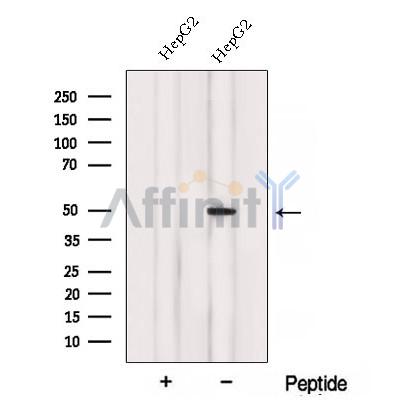ACADL Antibody - #DF12806
| Product: | ACADL Antibody |
| Catalog: | DF12806 |
| Description: | Rabbit polyclonal antibody to ACADL |
| Application: | WB |
| Reactivity: | Human, Mouse, Rat |
| Prediction: | Pig, Zebrafish, Bovine, Horse, Sheep, Rabbit, Dog, Chicken, Xenopus |
| Mol.Wt.: | 48 kDa; 48kD(Calculated). |
| Uniprot: | P28330 |
| RRID: | AB_2845767 |
Related Downloads
Protocols
Product Info
*The optimal dilutions should be determined by the end user. For optimal experimental results, antibody reuse is not recommended.
*Tips:
WB: For western blot detection of denatured protein samples. IHC: For immunohistochemical detection of paraffin sections (IHC-p) or frozen sections (IHC-f) of tissue samples. IF/ICC: For immunofluorescence detection of cell samples. ELISA(peptide): For ELISA detection of antigenic peptide.
Cite Format: Affinity Biosciences Cat# DF12806, RRID:AB_2845767.
Fold/Unfold
ACAD4; ACADL; ACADL_HUMAN; Acyl Coenzyme A dehydrogenase long chain; Acyl-CoA dehydrogenase long chain; FLJ94052; LCAD; Long chain acyl CoA dehydrogenase; Long-chain specific acyl-CoA dehydrogenase, mitochondrial;
Immunogens
A synthesized peptide derived from human ACADL, corresponding to a region within the internal amino acids.
- P28330 ACADL_HUMAN:
- Protein BLAST With
- NCBI/
- ExPASy/
- Uniprot
MAARLLRGSLRVLGGHRAPRQLPAARCSHSGGEERLETPSAKKLTDIGIRRIFSPEHDIFRKSVRKFFQEEVIPHHSEWEKAGEVSREVWEKAGKQGLLGVNIAEHLGGIGGDLYSAAIVWEEQAYSNCSGPGFSIHSGIVMSYITNHGSEEQIKHFIPQMTAGKCIGAIAMTEPGAGSDLQGIKTNAKKDGSDWILNGSKVFISNGSLSDVVIVVAVTNHEAPSPAHGISLFLVENGMKGFIKGRKLHKMGLKAQDTAELFFEDIRLPASALLGEENKGFYYIMKELPQERLLIADVAISASEFMFEETRNYVKQRKAFGKTVAHLQTVQHKLAELKTHICVTRAFVDNCLQLHEAKRLDSATACMAKYWASELQNSVAYDCVQLHGGWGYMWEYPIAKAYVDARVQPIYGGTNEIMKELIAREIVFDK
Predictions
Score>80(red) has high confidence and is suggested to be used for WB detection. *The prediction model is mainly based on the alignment of immunogen sequences, the results are for reference only, not as the basis of quality assurance.
High(score>80) Medium(80>score>50) Low(score<50) No confidence
Research Backgrounds
Long-chain specific acyl-CoA dehydrogenase is one of the acyl-CoA dehydrogenases that catalyze the first step of mitochondrial fatty acid beta-oxidation, an aerobic process breaking down fatty acids into acetyl-CoA and allowing the production of energy from fats (By similarity). The first step of fatty acid beta-oxidation consists in the removal of one hydrogen from C-2 and C-3 of the straight-chain fatty acyl-CoA thioester, resulting in the formation of trans-2-enoyl-CoA (By similarity). Among the different mitochondrial acyl-CoA dehydrogenases, long-chain specific acyl-CoA dehydrogenase can act on saturated and unsaturated acyl-CoAs with 6 to 24 carbons with a preference for 8 to 18 carbons long primary chains.
Acetylation at Lys-318 and Lys-322 in proximity of the cofactor-binding sites strongly reduces catalytic activity. These sites are deacetylated by SIRT3.
Mitochondrion matrix.
Belongs to the acyl-CoA dehydrogenase family.
Research Fields
· Metabolism > Lipid metabolism > Fatty acid degradation.
· Metabolism > Global and overview maps > Metabolic pathways.
· Metabolism > Global and overview maps > Fatty acid metabolism.
· Organismal Systems > Endocrine system > PPAR signaling pathway.
Restrictive clause
Affinity Biosciences tests all products strictly. Citations are provided as a resource for additional applications that have not been validated by Affinity Biosciences. Please choose the appropriate format for each application and consult Materials and Methods sections for additional details about the use of any product in these publications.
For Research Use Only.
Not for use in diagnostic or therapeutic procedures. Not for resale. Not for distribution without written consent. Affinity Biosciences will not be held responsible for patent infringement or other violations that may occur with the use of our products. Affinity Biosciences, Affinity Biosciences Logo and all other trademarks are the property of Affinity Biosciences LTD.

